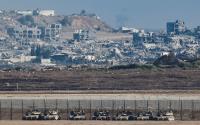23 June 2005The Telegraph
 |
| US secretary of state Condoleezza Rice at the G8 foreign minister’s meeting in London. (Reuters) |
Unconvinced that the world is warming, President George W. Bush looks set to shun pleas by his main industrial allies to step up a fight against climate change at a Group of Eight summit next month.
The July 6-8 talks will test how far other G8 nations, and big developing countries whose leaders will also attend, are willing to stick to UN schemes to curb emissions of heat-trapping gases without the US, the top polluter.
“The choice at the summit is a weak agreement or no agreement at all,” said Elliot Diringer, a director of the Washington-based Pew Center, an environmental think-tank.
“There is no indication that the Bush administration is willing to move in any significant way,” he said of the Scotland summit, where climate change and aid to Africa are top themes.
British Prime Minister Tony Blair, the host, says that greenhouse gases from human activities may cause catastrophic floods, heat waves and storms that could drive many species to extinction and push up sea levels by a metre by 2100.
He calls climate change “probably, long-term the single most important issue we face as a global community” — eclipsing threats like poverty, AIDS or terrorism.
But a leaked draft of a final statement for the summit underscores a gulf between Bush and Blair about the extent of the problem. It includes no firm targets, timetables or cash.
In a June 14 draft, the sentences: “Our world is warming” and “We know that the increase is due in large part to human activity” are in brackets, indicating US disagreement.
Many scientists are aghast — the science academies of all G8 nations as well as of China, India and Brazil said this month that burning of fossil fuels in power plants, cars and factories seemed the main cause of recent warming.
“I think the consensus is very, very strong and very compelling that we are on a warming trend,” said Rajendra Pachauri, chairman of a panel of more than 2,000 scientists that advises the UN on climate policy.
“I do not despair,” he added, pointing to measures by US states and companies to cut emissions of carbon dioxide, the main greenhouse gas, and EU markets where industries trade carbon dioxide allowances as part of a long-term scheme to cut emissions.
Environmentalists hail Blair’s drive against climate change, even though it always seemed wishful thinking that Washington might repay Blair’s support for the 2003 war in Iraq by joining other G8 countries in capping greenhouse gas emissions.
“We think it’s very important that (Blair) stands up to President Bush just as he did to other leaders in the EU budget debate,” said Jennifer Morgan, climate expert at the WWF conservation group.
Blair is isolated in an EU row about the bloc’s finances.
Morgan said that Blair should ignore Bush and work with China, India, Brazil, Mexico and South Africa, whose leaders will also attend.
G8 nations Japan, Germany, Britain, France, Italy, Canada and Russia have all signed up for the U.N.'s Kyoto protocol.






